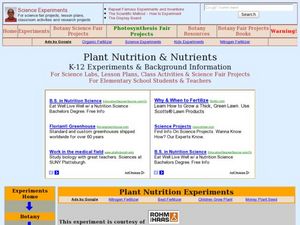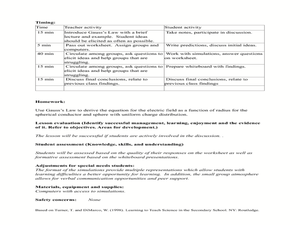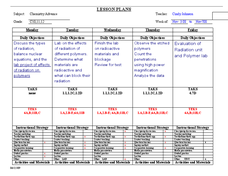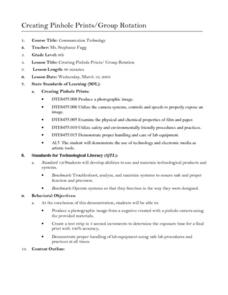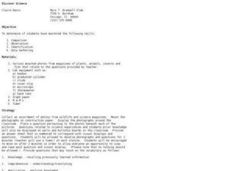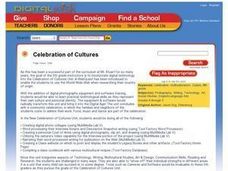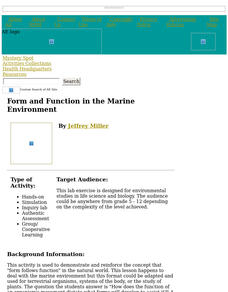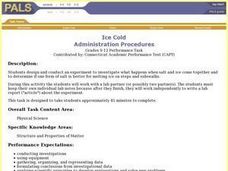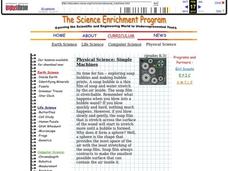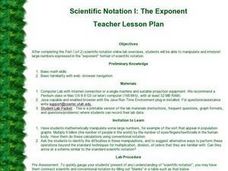Curated OER
Galvanometers
Students construct their own galvanometer. In this physics lesson, students explain how it is used to detect electric current. They conduct an experiment to measure how much electricity flows through the circuit.
Curated OER
Resistor and Resistance
Students explore electrical resistance through various experiments. In this physics lesson, students calculate resistance using a mathematical formula. They explain how colors identify the resistance value of a resistor.
Curated OER
Plant Nutrition and Nutrients
Students observe seeds growth and examine the different parts of the seedling. In this biology lesson, students compare the growth of seeds planted in soil and in hydroponics. They record their observations in their science journal and...
Curated OER
Build Your Own Hovercraft
Students construct a hovercraft following specific procedures. In this technology lesson, students explain the physics principles behind hovercraft. They compare and contrast this machine with the aircraft.
Curated OER
Comparative Stream Quality
Students examine water quality on a nearby stream. They collect water samples and test for various factors, including any contamination from the treatment plant, and present their information in a Powerpoint presentation.
Curated OER
Gauss' Law
Young scholars derive the equation of Gauss's law. For this physics lesson, students investigate the factors affecting the strength of the electric field. They perform simulation on Gauss's law.
Curated OER
Nuclear Chemistry
Young scholars write and balance nuclear equations. For this chemistry lesson, students identify materials that block radiation using polymers. They collect and analyze data from the experiment.
Curated OER
Identify the Phases of the Cell
In this cell phases worksheet, 7th graders study the phases of an onion cell. Students write the onion mitosis cell phases on the lines.
Curated OER
Cells, The Structural and Functional Units of Life
Students observe the general structure and organelles of plant and animal cells. Students prepare microscope slides of elodea, onion, check, and cork and identify the cells by size and shape as unicellular, multicellular, plant or animal.
Curated OER
Creating Pinhole Prints
Ninth graders produce an image from a negative created with a pinhole camera using the provided materials and create a test strip in 5 second increments to determine the exposure time for a final print.
Curated OER
Discover Science
Students practice scientific research skills. In this lesson about science, students gain experience with the following skills: comparison, observation, identification, and data gathering. Students will go from station to station and...
Curated OER
Wacky Water Critters
Students visit a local creek or stream. They collect water samples from the creek and observe and sort the "water critters" they find in the sample, observing smaller organisms under a microscope if necessary. They identify each organism...
Curated OER
Determination of Tensile Stress-Strain Common Properties in Materials
Young scholars demonstrate the relationship between stress and strain, then graph stress-strain curves for various common materials. Students interpret graphed results and discuss differences in mechanical properties of materials.
Curated OER
Celebration of Cultures
Students create a multimedia project to represent their own culture and personal identity. They design a personal Coat of Arms using a computer graphics program and digital camera, write a script and film an interview, and contribute a...
Curated OER
Form and Function in the Marine Environment
Students study the relationship of form and function in the marine environment.
Curated OER
Rainbow Electrophoresis
Learners are introduced to the principles of gel electrophoresis and also provides an opportunity for students to practice loading gels and prpetting. In this laboratory activity, food color is used to separate into constituent pigments.
Curated OER
Ice Cold
Students design and conduct an experiment to investigate what happens when salt and ice come together and to determine if one form of salt is better for melting ice on steps and sidewalks.
Curated OER
Simple Machines
Students discover what simple machines are and identify a gear, a pulley, and a lever. In teams, they build at least two models each of simple machines and challenge them with specific instruction cards. Finally, students present and...
Curated OER
Introduction to the Scientific Method
Students designs and conduct a scientific experiment that identifies the problem, distinguishes manipulated, responding and controlled variables, collects, analyzes and communicates data, and makes valid inferences and conclusions.
Curated OER
Making Your Own Sampling Tools
Students examine cause-and-effect relationship between human attitudes and behavior in the environment. They also assist citizens in increasing their sensitivity and stewardship for the environment.
Curated OER
Scientific Notation I: The Exponent
Pupils manipulate and interpret large numbers expressed in the "exponent" format of scientific notation.
Curated OER
Scientific Method and Graphing
Seventh graders use the scientific method to determine how many seeds are in a watermelon.
Curated OER
What Is the Freezing Point?
Students remove heat energy and determine how it causes a phase change.
Curated OER
Analysis of Lobster Claw Function. An Exercise in Biomechanics
Students observe two chelae. They write three differences they observe in their notebooks. Students suggest a hypothesis which would explain these differences. They dissect the chela. Students analyze the lobster claw as a mechanical lever.
Other popular searches
- Identifying Lab Equipment
- Science Lab Equipment
- Lab Equipment Quiz
- Basic Lab Equipment
- Chemistry Lab Equipment
- Using Lab Equipment
- Lab Equipment Worksheet
- Classroom Lab Equipment
- Use of Lab Equipment
- Biology Lab Equipment
- Science Lab Safety Equipment
- Chem Lab Equipment




